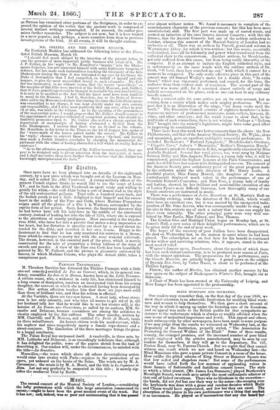PARISIAN THEATRICALS.
M. Theodore Barriere has favoured the Theitre Francais with a little one-act comedy,i entitled Le Feu au Couvent, which, in its general ten- dency, resembles la Joie de la Haison, known here as the Little Treasure. A certain count, who, a widower in early life, has abandoned himself to a long course of dissipation, receives an unexpected visit from his young daughter, the convent in which she is educated having been destroyed by fire. Her artless affection teaches him that there are joys more solid than those of brilliant vice, and thus his reform is effected. At the Varietes, there are two new farces. A stout lady, whose stout- ness is her only calamity, and who tries all means to get rid of it, till her husband tells her that he would like to see her stouter still, is the heroine of La Femme auz Corniehons so called by its authors, MM. Si- raudin and Delaconr, because cucumbers are among the antidotes to obesity employed by the fair sufferer. The other novelty, written by MM. Clairville and E. Moreau, and entitled Us Dade de Monde, turns on three mesalliances. An honest citizen weds his maid-servant, while his nephew and niece respectively marry a female rope-dancer and a street-conjuror. The dissolution of the three marriages brings the piece to a happy conclusion.
The Palais Royal has surpassed itself. A vaudeville in three acts, by MM. Lablaehe and Delacour, is so exceedingly indelicate that, although it has delighted the public' some of the papers shrink from the task of describing it. Our readers will, under the circumstances, be satisfied with the title—La Sensitive.
Marseilles,—the town which above all others decentralizing artists would raise into rivalry with Paris—rejoices in the production of an opem, yet unheard on the banks of the Seine. The words are by M. A. Cfarcassone ; the music is by M. A. Morel, and the title is Le Jugement de Dien. Let not any profanity be suspected in this title ; it merely sig- nifies the medieeval Trial by Battle.


























 Previous page
Previous page